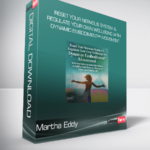Martha Eddy – The Shift Network – Reset Your Nervous System & Regulate Your Own Wellbeing With Dynamic Embodiment℠ Movement
Original price was: $297.00.$94.00Current price is: $94.00.
Learn rituals as well as improvisation — staying present in each moment to help your body respond to its surroundings.
- Description
- Reviews (0)
Description
Martha Eddy – The Shift Network – Reset Your Nervous System & Regulate Your Own Wellbeing With Dynamic Embodiment℠ Movement

Explore Dynamic EmbodimentSM Somatic Movement Therapy to regulate your nervous system and move through conflict, stress, and trauma — using body awareness and strategies like Dr. Martha Eddy’s Active Witnessing ProcessSM.
Your body and nervous system can easily become dysregulated and out of balance when chronic stress is part of your life — as it is for so many of us right now.
Whether it’s anxiety, depression, sleep difficulties, or physical aches and pains, stress can show up in many areas of life.
But you have more power than you might realize — because, right now as you read this, you possess the ability to regulate your own nervous system.
To fully embrace this innate power, you’ll first need to know how your unique nervous system works, take the time to feel it — and become clear on how it impacts your everyday behavior.
A powerful way to deeply understand and regulate your nervous system is through Dr. Martha Eddy’s Dynamic Embodiment Somatic Movement Therapy (DE-SMT).
As you practice DE-SMT, you’ll integrate technical skill-building exercises with meditation, relaxation, healing postures, and new movements. Learn rituals as well as improvisation — staying present in each moment to help your body respond to its surroundings.
Join us for an empowering 7-module online course with Martha — and somatic movement therapist — as you learn to pay close attention to the soma (the living body) and discover your own inner truths about what creates stress for you, when you feel safe to be fully vulnerable, and how you can best connect with others, even during times of stress and conflict.
During your seven modules with Martha, you’ll calm and restore your nervous system, establishing a baseline that you can reactivate when needed — until it’s fully rested, alive, and receptive — unlocking feelings of happiness, balance, health, and wellbeing.
Each module, you’ll practice guided, tailored movements, embodied visualizations, meditations, healing postures, and play to enhance your bodily awareness, balance your nervous system, shift your physiological status quo, and develop peaceful, self-regulated responses to conflict and/or stress.
With a doctorate in Movement Sciences and Education from Columbia University, Martha is a Registered Somatic Movement Therapist (RSMT) trained in Massage Therapy and known for her Dynamic Embodiment somatic-movement contributions in the fields of dance, dance science, conflict resolution, child development, and vision enhancement.
You won’t need any somatic-movement experience or a performance background to fully embrace Martha’s unique modalities.
She’ll equip you with new tools to navigate stressful times, provide you with rituals you’ll want to return to, and guide you to build a comforting sense of structure into your life — for a happier, healthier you.
During this powerful 7-module course, you’ll:
- Deeply understand the inner workings of your nervous system — including how to calm or energize it with the right movements
- Move through embodiment practices to develop peaceful responses to everyday conflicts
- Shift your consciousness with Dynamic Embodiment Somatic Movement, to better know your often unconscious responses and new coordination
- Develop greater body awareness and vagal-nerve responses determine where you are on Martha’s Stress-to-Trauma Continuum
- Read your own body language as it communicates whether you’re safe or in danger
- Apply your newfound knowledge of your nervous system to successfully navigate stress and conflict — in your daily life and the larger world
- Explore the ways you’re unintentionally “othering” people, causing you to miss out on essential connections with others — a true key to healing
- Discover the power of choice as you work with and through different types of stress using intentional movements
- Learn and practice infant-like movements to gain insight into your adult self
- Map out the personal movement practices you most need for stress management and deep healing
- Connect with others to regulate and heal your nervous system
- Discern who in your life it’s safe to be your true self with
- Explore powerful, personalized practices to regulate your nervous system whenever you need to
- And much more…
What You’ll Discover in These 7 Modules
In this 7-part transformational intensive, Martha will guide you through Dynamic Embodiment movement techniques to alleviate stress, amplify inner peace, and reclaim your optimal health.
This course will feature step-by-step teachings and experiential practices with Martha. Each session will build harmoniously upon the previous ones, so you’ll develop a holistic understanding of the practices, tools, and principles of Dynamic Embodiment Somatic Movement Therapy to regulate your nervous system with nourishing, easygoing ways to work through conflict, stress and trauma.
Module 1: Cultivating & Accessing Neurocellular Awareness Through Movement
A calm nervous system provides a baseline for healthy reactivation of an alive and receptive nervous system — and a happier you.
Did you know your nervous system can become dysregulated even if you feel like you’re in a passive state of mind?
To calm or balance your nervous system, you first must know how it works — taking time to feel it so you can discern how it impacts your everyday behavior.
Sensitizing movements enhance your bodily awareness as your body senses a change in the status quo. When you speak, walk, draw, or dance — then learn to pay attention to the new sensations — you’ll gain empowering new information about yourself.
This consciousness-shifting process, moving the body to increase self-awareness and act with greater clarity and conviction, is known as DE somatic movement.
By paying attention to the soma (the living body), you’re listening to your body, which is capable of both survival and expression.
This somatic listening supports self-regulation, self-care, and greater health. It can be a tool for guidance and attunement with your outward direction and your inner truths.
In this opening module, you’ll come to understand the key components of the nervous system — the involuntary (autonomic) functions and the voluntary functions.
Martha will share how you can awaken connection to the autonomic nervous system, the vagus nerve, and the skeletal-muscular system — through awareness of glands, organs, fluids, and the nerves that activate them.
You’ll discover the power of choice as you work with, through, and hopefully against different types of stress. Each stressor is experienced through your body — and slowing down to feel and move your body is a huge part of the solution.
In this session, you’ll discover:
- How your body and consciousness are related
- Neurocellular awareness and how to access it
- An embodied map of the nervous system and its key functions
- The causes of dysregulation — from stress to conflict to trauma
- What to do to calm your body
- Guided movement practices for balancing your nervous system, including embodied visualizations and meditations, relaxing movements, and play — all within a caring and socially aware setting
Module 2: Remembering Your Early Childhood Movement Patterns to Gain Insight Into Your Adult Self
Why is early motor experience important?
How you move today is based on your early childhood experiences.
As you’ll discover in this module, by learning and even practicing the basic coordination of baby movements, you’ll gain insight into your adult self.
Connections to old, stuck places often emerge. Because some infant movements are hard to perform as an adult, Martha will share the adaptations she’s created for going through developmental movements of creeping, crawling, toddling, and walking that are easier on the body — with options to sit, stand, and lie down.
This Relax to FocusSM movement series can be done seated in a chair, on the floor, or standing — as your body sinks, rises, encloses, spreads, advances, and retreats.
Martha will guide you to experience how you first behaved as a baby — with movement responses, including vocalizations.
When moving, even from one seated posture to another, you’ll also explore different moods and states of mind. You’ll learn “movement scales,” rituals or sequences for aligning with your attention, finding different emotional responses.
You’ll also become alert to the nonverbal communication habits that are connected to your posture, your movement, and the pitch of your voice.
In this module, you’ll explore:
- A neurodevelopmental approach to your habitual movements — or baby movements, as Martha calls them
- Your relationship with your caregivers and its impact on your personality and behavior
- Brain-mood-body movement connections — and why movement is behavior
- How you breathe and move when you’re calm or stressed — and ways to coordinate breath and movement
- Four easygoing guided movement practices to support effective approaching and withdrawing, bonding and defending, and reaching and pushing — to locate what’s inside, outside, and between different parts of yourself as you calm your nervous system
Module 3: Developing Peaceful Responses to Conflict in Everyday Life Through Embodiment Practices
Conflict resolution is an important skill in life. Bringing your body wisdom into handling conflict can expedite staying present.
In this module, you’ll explore embodying peace at home, in work, and at play.
Martha’s EmbodyPeace approach includes numerous models of resolving conflict — developed over 40 years while working with people of all ages in schools, universities, nonprofits, and for-profit organizations.
Martha will explain traditional systems of negotiation and mediation. You’ll explore how embodiment, including inner and outer awareness (interoception and exteroception), establishes the ground and insight for peaceable responses to conflict.
Interoception is awareness within the body — and sadly, it’s rarely taught. New vocabulary will help unpack how you have access to your inner wisdom and bodily knowing.
Using the flow of movement that emerges unconsciously through hand gestures or postural shifts, you’ll learn how Martha’s Active Witnessing Process can help you find words for feelings, and movement for action. You’ll feel more embodied.
Exteroception refers to your senses that pay attention to the environment outside of your body. Martha will guide you to explore this space of inner and outer flow, the betweenness.
As you balance your nervous system, you’ll ask yourself:
How do I see, feel, then react to disagreements, conflicts, abusive situations, and harm? How do I come into feeling safe? When do I feel safe enough to stand up for a systemic change?
In this session, you’ll discover:
- How movement of the eyes and heart are both key for deepening attunement with your emotion
- The delightful surprise of finding words for feelings, and movements that support statements and actions
- The C.A.P.S. system of conflict resolution — Cool Down, Agree, Points of View, Solving Problems
- Interoception of rising emotions — clarifying proprioception, kinesthesia, nociception, neuroception, and visceroception
- Using “the balance of inner and outer focus” as Ariadne’s string to find the way back to a self-regulated state
- How to use Martha’s Active Witnessing Process
- A somatic social-justice perspective, anchoring your body as you picture transformative and restorative justice — and experience “body alerts” to your own bias and prejudice
Module 4: Recognizing Where You Are on the Stress-to-Trauma Continuum Through Body Awareness & Vagal Nerve Responses
As you apply what you’ve learned in the last three modules, you’ll begin to notice your personal stressors — plus the larger pressures on our culture and world.
In this module, you’ll explore what Martha calls the Stress-to-Trauma Continuum, which asks the questions:
How do stress and trauma differ? How are they the same? When does internal conflict or conflict with others play a part in what’s happening? How do our bodies and awareness of the vagal nerve responses, body tone, and movement help us recognize what state we’re in?
Martha will guide you to ask personal questions, understanding that you and your classmates will have very different answers. Questions will include:
What can you control? What do you need to let go of? What is the role of intuition? How can you be more observant of the present moment? What helps you look into the future without fear? When is it helpful to recognize these issues — and when do you need to set boundaries?
You’ll ground and center, then imagine a slightly stressful situation and explore how it can be of service to you. You’ll learn the bodily skills that can balance the nervous system enough for safety and help you find physiological calm.
In this session, you’ll discover:
- The similarities and differences between stress and trauma
- The vagus nerve’s role in determining our psychological and emotional states — and how a myriad of common psychological and physical symptoms, from anxiety and depression to migraines and back pain, link back to an issue with the vagus nerve
- Differences between homeostasis (maintaining body systems such as blood pH or body temperature) and allostasis (maintaining stability through altering physiologic parameters to counteract challenges)
- Movement’s role in stress and stress management, including the positive use of reflexive responses
- A 5- to 10-minute movement practice, Calming the Nervous System & Engaging the Parasympathetic Nervous System
- How to dissipate stressors with return to the breath and imagery strategies
- A guided movement practice where you’ll embody boundaries with your lymph, muscles, and gaze, strengthening your ability to act for change
Module 5: Mapping Your Personal Movement & Dynamic Embodiment Practices
Everyone has unique bodies and pasts. Your genetics and life lessons — nature and nurture — influence who you are today.
In this module, you’ll review which function each type of movement serves — for instance, relaxation, activation, interaction, and play.
You’ll reflect on which activities are best for you and develop a map for handling your emotions and body sensations in different situations.
You’ll use journal writing, visualization, movement, and vibration as ways to perceive what is, support what feels challenging, and move into new bodymind states.
You’ll explore Dynamic Embodiment’s O.S.O. model — Observe, Support, and Optimize.
You’ll work with the mystery and anatomy of breathing. Martha will walk you through three-dimensional breathing using your thoracic diaphragm to breathe in all dimensions.
As you breathe, you’ll reinforce different postures that hold stories and impact your neuroendocrine system, hormones, and chakras. Martha’s guided practice will help you experience how surges of hormones can be released through breath and movement.
You’ll track which activities you’re most likely to stick with. As Martha will share, we only benefit from what we actually do, or at least imagine. You’ll find the pathways in your nervous systems to be who you fully are, as a unique individual.
From there, you’ll commit to a practice — your personal journey.
In this session, you’ll discover:
- How to use journal writing to help uncover when you’re stressed, irritated, and more
- How belly breathing also moves your pelvic floor, vocal cords, and some of the fascia around your brain — and how each can serve as a support
- Which habits get in your way right when you’re hoping to regulate your system
- Your profound resiliency skills
Module 6: Regulating Your Nervous System & Healing Through Connection With Others
In this module, Martha will help you see the ways you glean support and create separation from the people around you.
You’ll also explore ways to work with conflict, stress, and trauma — and learn to notice which systems set up chronic tensions like humiliation, abuse, or feelings of neglect and unworthiness.
Understanding the social systems you’re operating within helps you connect more deeply with others — and connection is your key to healing.
You’ll explore how bonding with and defending are responses to other people. How do they show up in movement? When do you attach, and what does your body do? When do you separate, become more numb, or even disappear a bit? What’s useful and what’s harmful about each of your responses?
In this session, you’ll discover:
- How to notice the ways you “other” people or groups — in this process, Martha will help you learn more about your own systems of dysregulation
- How your eyes and vision help with orienting you
- Techniques for regulating your gaze during a “group sway” practice
- What happens when you or someone you know is blocked by shame, humiliation, or destructive forces — and how to dialogue in a way that supports compassion and healthy desire
- Guided movement practices —including the body language for saying yes and no, gazing with compassion, rocking to co-regulate, and techniques to calm your nervous system
Module 7: Safely Sharing Your True Self With Others
In this closing module, Martha will guide you to review all the concepts you’ve explored during the course.
At this point on your journey, you’ll be able to feel when it’s safe to share your true self.
You’ll review times when you may have wanted to remain hidden, as well as your freest moments when your authenticity comes through. Martha will help you recognize the related feelings and sensations.
You’ll role-play (in the privacy of your own Zoom space) with concrete situations, allowing your vulnerability to come forward.
You’ll discern when it’s possible to be vulnerable with family, friends, or colleagues. You’ll solidify the resources you brought with you into this journey, those you’ve learned along the way — and get clear on the ones you’ll want to keep practicing.
And you’ll visualize barriers and stumbling blocks, moving with them to melt them away..
In this session, you’ll:
- Show Martha what you’ve learned (if you’re feeling called)
- Check in with how resourced you are — what bodily and cognitive information you have available
- Review how differences of opinion or beliefs, as well as surprises, can be reframed within life as part of an improvisational model
- Use your awareness of prejudice and bias to cultivate compassion for yourself and others
- Move through a practice personalized by you, for you — and try to explain it to your classmates, if you’re feeling called
An Unprecedented Opportunity to Join the Reset Your Nervous System & Regulate Your Own Wellbeing With Dynamic Embodiment Movement Online Training
We feel honored that Dr. Martha Eddy has chosen to partner with The Shift Network to offer this exclusive online training. This is a unique opportunity to learn from a leading expert on embodiment and somatic movement whose powerful insights and pioneering work are helping us heal and transform ourselves and our world.
If you’re serious about exploring Dynamic Embodiment movement to regulate your nervous system and work through conflict, stress, and trauma, then you owe it to yourself, your loved ones, and our world to take this one-of-a-kind training.
If you’re ready to take the next step in evolving yourself, click the register to reserve your space now.
Get Digital Download ” Martha Eddy – The Shift Network – Reset Your Nervous System & Regulate Your Own Wellbeing With Dynamic Embodiment℠ Movement ” Right Now!




Reviews
There are no reviews yet.